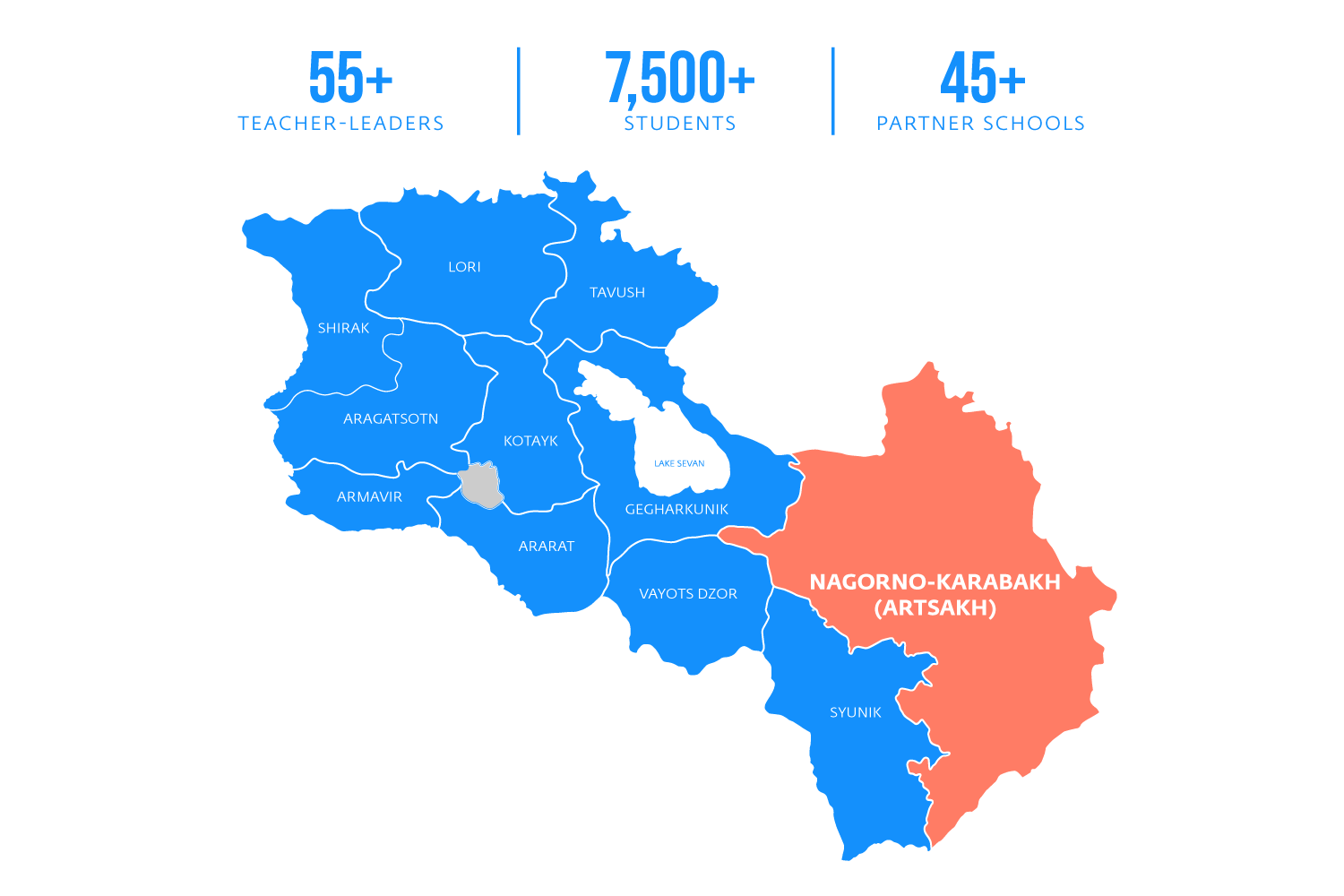
TEACH FOR ARMENIA’S WORK IN
NAGORNO-KARABAKH (ARTSAKH)
(2017–2023)
Teach For Armenia launched its efforts in Nagorno-Karabakh (Artsakh) in 2017, with a deep commitment to expanding educational opportunities in underserved communities. Through the placement of committed Teacher-Leaders, we invested in students, empowered educators, and built enduring partnerships with families, schools, and local leaders.
Between 2017 and 2023, our Teacher-Leaders served in communities across Nagorno-Karabakh (Artsakh), collaborating closely with stakeholders to strengthen learning environments and advance student potential. These years laid the groundwork for what became a long-term commitment to the region, one rooted in trust, resilience, and a shared belief in the transformative power of education.
Read more about Teach For Armenia’s work in Nagorno-Karabakh (Artsakh) in the 5-Year Impact Report:
EDUCATION IN EMERGENCIES
(2020 WAR RESPONSE)
In the wake of the 2020 Artsakh War, Teach For Armenia launched a rapid-response Education in Emergencies initiative to support forcibly displaced students across Artsakh and Armenia. Recognizing the urgent need for both academic continuity and emotional healing, we mobilized resources to meet students where they were, providing support and guidance.
Through this effort, we distributed over 500 care packages to families and, in partnership with the Armenian Missionary Association of America, provided tablets and internet access to 250 students who lacked digital connectivity, ensuring their continued ability to learn remotely.
In parallel, we partnered with local coalitions and mental health professionals to offer trauma-informed teaching, social-emotional learning, and art therapy, including sand-art classes, to help children process the psychological toll of war and rebuild a sense of safety, expression, and community.
RIGHT TO EDUCATION DURING THE BLOCKADE
(DECEMBER 2022–SEPTEMBER 2023)
In September 2022, the Government of Azerbaijan launched a series of attacks on civilian communities within the Republic of Armenia, specifically in the Gegharkunik, Syunik, and Vayots Dzor regions, including areas where Teach For Armenia places Teacher-Leaders to work in partner schools.
From December 2022 until September 2023, the Government of Azerbaijan imposed a total blockade of Artsakh, severely disrupting access to food, healthcare, and education. Over 30,000 children were affected, in violation of their rights under international law. The closure of the Goris–Stepanakert corridor paralyzed movement, making it impossible for local and international organizations to operate. Civilians were unable to return to their communities, and our staff, alumni, teachers, and students found themselves trapped under siege conditions. Access to education was completely cut off, and our communities endured severe malnutrition and critical health crises.
During the forced and total displacement of Artsakh’s people in September 2023, Teach For Armenia’s students, communities, stakeholders, staff, teachers, and alumni were profoundly impacted. Tragically, some of our students lost their lives as a result of the indiscriminate shelling and bombing of civilian areas. These are not just personal tragedies; they are violations of the fundamental rights of children to learn, to thrive, and to live in safety and dignity.
EDUCATION IN EMERGENCIES
(2023 RESPONSE & ONWARD)
In response to the 2023 forcible displacement of the Armenian population of Nagorno-Karabakh (Artsakh), Teach For Armenia launched a coordinated emergency initiative to support students and families as they resettled into new communities and began the long process of healing.
Building on lessons learned from our 2020 war response, we established the 405 Educational Alliance, a coalition of organizations dedicated to providing comprehensive, wraparound support for forcibly displaced students. In close collaboration with the Government of Armenia, we are working to transform public schools into local hubs of resilience, coordinating access to education, psychosocial support, nutrition, and other essential services. Our goal is to ensure that every child and family affected by displacement has the foundation they need to begin rebuilding their lives with dignity and hope.
OUR IMPACT IN NAGORNO-KARABAKH (ARTSAKH)
PARTNERSHIPS IN ACTION
UNICEF Armenia
Following the forcible displacement of over 100,000 people from Nagorno-Karabakh (Artsakh) in 2023, including approximately 30,000 children, Teach For Armenia partnered with UNICEF Armenia to deliver urgent educational and psychosocial support.
Drawing on its experience in emergency response, Teach For Armenia helped establish trauma-informed frameworks within schools, embedding mental health services, social-emotional learning, and therapeutic approaches such as art and play-based healing.
This initiative complemented UNICEF Armenia’s broader efforts, which included the distribution of essential school kits and learning materials, as well as the delivery of teacher training in trauma-sensitive practices. Together, these efforts aimed to ensure that forcibly displaced students from Nagorno-Karabakh (Artsakh) could begin to recover, reconnect, and reintegrate—both emotionally and academically—into their new communities.
World Bank in Armenia
Since 2023, Teach For Armenia has served as a key implementation partner in a $2.9 million World Bank-funded initiative to support teachers in providing psycho-social Support to displaced children from Nagorno-Karabakh (Artsakh) across more than 200 schools.
Co-led with Armenia’s Ministry of Education and other key institutions, the initiative focuses on building the capacity of school staff to embed mental health services into daily learning environments, strengthening students’ emotional resilience, fostering inclusion, and supporting long-term societal integration.
In parallel, Teach For Armenia is contributing to broader World Bank efforts to modernize Armenia’s education system, including improvements to school infrastructure and the advancement of STEM curricula, ensuring that all students, regardless of background, have access to a high-quality, future-ready education.




